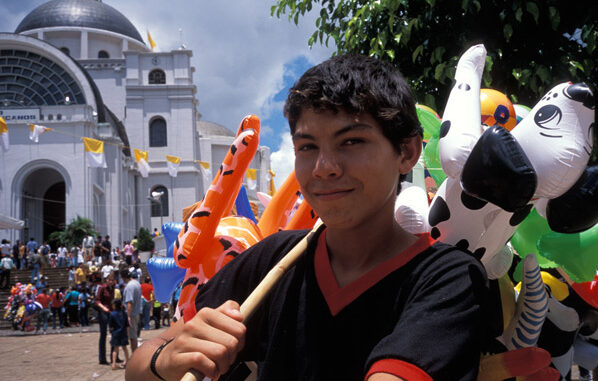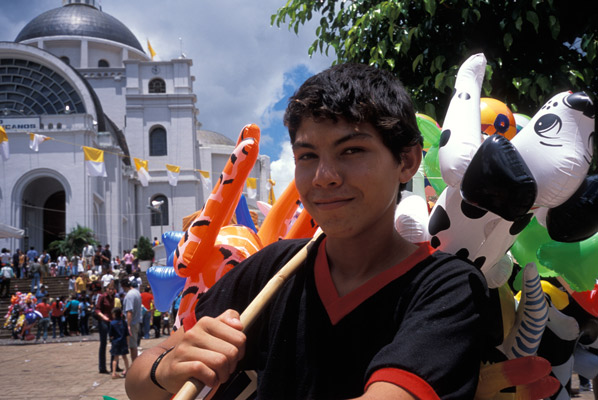

Brian Atkinson/Alamy
A young man of Guarani descent
How many languages do you speak fluently? If you lived in Paraguay, you would most likely speak at least two. Paraguay is a bilingual country with a bilingual constitution, and most people speak both Guaraní and Spanish. About 95 percent of the people are mestizo, a mix of Spanish and Guaraní, and they take pride in this heritage and tradition. Guaraní, once spoken throughout much of South America by the indigenous peoples, became one of Paraguay’s two official languages in 1992. In fact, in all public schools Guaraní is a required part of the curriculum. Classes are taught in both Guaraní and Spanish, and the government-produced textbooks are written half in Spanish and half in Guaraní. How would you like all your classes to be taught in two languages? Sounds difficult! Spanish tends to be used more in business dealings, while Guaraní is used equally in matters of art, expression, and everyday living.
Guaraní was originally spoken by the Guaraní people, the indigenous inhabitants of what is today Paraguay, Argentina, Bolivia, and Brazil. The Guaraní managed to keep their identity in Paraguay even after the Spanish conquest, in large part due to the Jesuit missions, or reducciones, where Guaraní was spoken. Jesuit missionaries protected the Guaraní against enslavement by the Spanish, converted them to Catholicism, taught them crop cultivation, livestock raising, and various trades, and developed their artistic abilities. Religious texts written by Jesuit priests in the seventeenth and eighteenth centuries marked the beginning of Guaraní as a written language and helped to ensure the language’s lasting effect.
Today in Paraguay you rarely hear pure Guaraní or pure Spanish being spoken. People speak Spanish with Guaraní phrases thrown in. Likewise, Guaraní includes vocabulary borrowed from Spanish, a mix called jopará. For example, Ne rentede pa? in Guaraní means “Do you understand?” The entende root is borrowed from the Spanish verb entender meaning “to understand.” Also, note that there are words in English that come from Guaraní roots, such as cougar, jaguar, piranha, and tapir.
So, are you ready to learn some Guaraní words and phrases?
Guaraní tends to be difficult for English speakers, partly because it involves sounds we’re not used to making, such as nasal sounds. For example, letters with a circumflex have a nasal pronunciation, so a is pronounced differently from â. Most Guaraní words are very different from Spanish words, but there are a few that are similar. The word cow in Spanish is vaca; in Guaraní it is vaka, pronounced slightly differently.
The following are the thirty-three characters of the Guaraní alphabet. Notice that the last letter is an apostrophe (called puso). This indicates a short break in the sound, like the
hyphen in “uh-oh.”
a-â-ch-e-ê-g-ĝ-h-i-î-j-k-l-m-mb-n-nd-ng-nt-ñ-o-ô-p-r-rr-s-t-u-û-v-y-ŷ-‘
The letters are divided into oral, or regular, sounds and nasal sounds. The circumflex (^) indicates nasal sounds. This is also sometimes written with a tilde (~) instead of a circumflex. Other letters (mb, nd, ng, nt) are also nasal. As in Spanish, an acute accent (é) indicates a stressed syllable that is different from the rule.
The following are the subject pronouns:
che I ñande we all
nde you ore we, just us
ha’e he/she peê you all, informal
ha’ekuéra they
Notice that, unlike English and Spanish, Guaraní has two words for the English pronoun we. Now read the following conversations and pick out the pronouns you know.
Mba’éichapa nderéra? Hello. What is your name?
Cheréra…. My name is….
Mba’éichapa nde pyhare? Hello. Good evening. (How are you this evening?)
Chepyhare porâ, ha nde? I am having a good evening, and you?
Chepyhare porâ avei. I am having a good evening, too.
Notice the word order in the sentences. What do you notice about the pronoun che?
You may want to learn the Guaraní numbers 1 to 10:
1 peteî 6 poteî
2 mokôi 7 pokôi
3 mbohapy 8 poapy
4 irundy 9 porundy
5 po 10 pa
Here are the days of the week:
Arateî Sunday
Arakôi Monday
Araapy Tuesday
Ararundy Wednesday
Arapo Thursday
Arapoteî Friday
Arapokôi Saturday
What do you notice that is interesting about the days of the week? First of all, they all begin with Ara. What do you suppose this means? Then notice the suffix of each day. It coincides with the numbers. Arateî means Day one, Arakôi means Day two, etc. So, the Guaraní language places the word for day first. In English, we place day at the end— Monday, Tuesday, etc. Do the Spanish days of the week follow any pattern?
Explore More:
1. If you are interested in linguistics, you might want to delve deeper into the evolution of the Guaraní language and its interrelationship with Spanish.
2. If you would like to be able to speak more Guaraní and listen to correct pronunciation and practice repeating it, explore the many Web sites devoted to teaching this language. There are even online Guaraní-English dictionaries!
Share What You Know:
1. Work with a partner to practice the short conversations, the numbers, or the days of the week. If you’re feeling ambitious, go on the Internet to learn other conversations. It will help to also listen to the correct pronunciation. Then present your short conversation or what you have learned to the class.
2. If you know how to speak any French, share with your classmates the nasal sound in words such as bon or français to give them an idea of how to pronounce the nasal sounds in Guaraní.